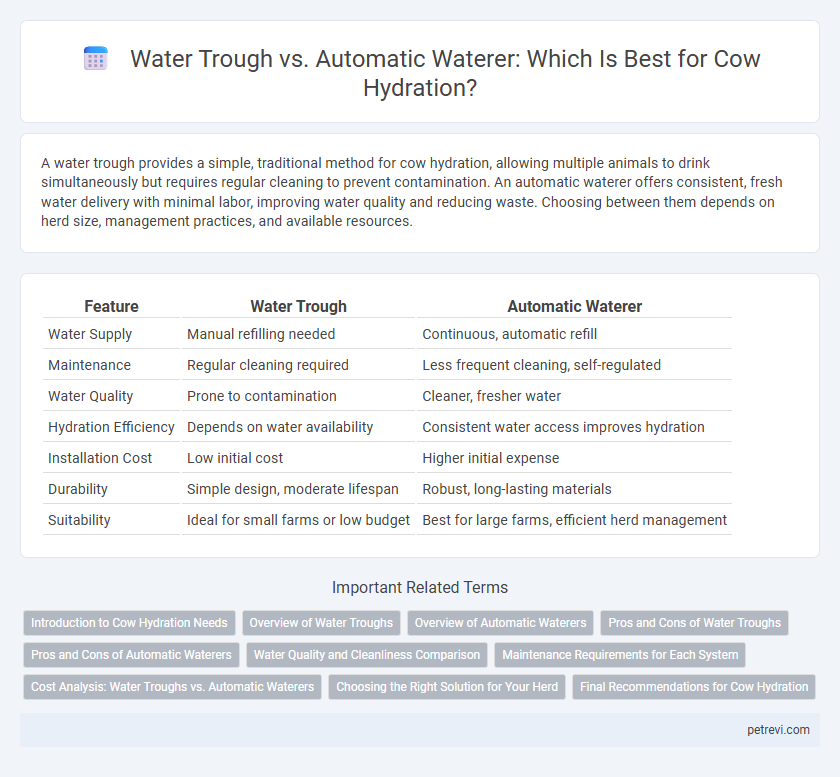A water trough provides a simple, traditional method for cow hydration, allowing multiple animals to drink simultaneously but requires regular cleaning to prevent contamination. An automatic waterer offers consistent, fresh water delivery with minimal labor, improving water quality and reducing waste. Choosing between them depends on herd size, management practices, and available resources.
Table of Comparison
| Feature | Water Trough | Automatic Waterer |
|---|---|---|
| Water Supply | Manual refilling needed | Continuous, automatic refill |
| Maintenance | Regular cleaning required | Less frequent cleaning, self-regulated |
| Water Quality | Prone to contamination | Cleaner, fresher water |
| Hydration Efficiency | Depends on water availability | Consistent water access improves hydration |
| Installation Cost | Low initial cost | Higher initial expense |
| Durability | Simple design, moderate lifespan | Robust, long-lasting materials |
| Suitability | Ideal for small farms or low budget | Best for large farms, efficient herd management |
Introduction to Cow Hydration Needs
Cows require consistent access to clean and fresh water to maintain rumen function, milk production, and overall health. Proper hydration supports thermoregulation and digestion, which are critical for livestock productivity and welfare. Comparing water troughs and automatic waterers reveals differences in water availability, cleanliness, and labor efficiency essential for optimizing cow hydration management.
Overview of Water Troughs
Water troughs are traditional open containers designed to provide cows with easy access to fresh drinking water, commonly made from materials such as concrete, metal, or plastic. These troughs require regular manual refilling and cleaning to maintain water quality and prevent contamination from debris or algae growth. While simple and cost-effective, water troughs demand consistent monitoring to ensure adequate hydration and avoid water stagnation that could impact cattle health.
Overview of Automatic Waterers
Automatic waterers provide a consistent and clean water supply for cows, improving hydration efficiency compared to traditional water troughs. These systems regulate water levels automatically, reducing waste and minimizing contamination risks. Enhanced hydration through automatic waterers supports better cattle health and increases overall farm productivity.
Pros and Cons of Water Troughs
Water troughs provide a simple and cost-effective hydration solution for cows, allowing multiple animals to drink simultaneously without mechanical failure risks. However, they require regular cleaning to prevent algae growth and contamination, which can impact water quality and animal health. Exposure to outdoor elements may lead to freezing in winter, reducing accessibility unless heated troughs or other preventative measures are used.
Pros and Cons of Automatic Waterers
Automatic waterers provide cows with continuous access to clean water, reducing labor and ensuring consistent hydration, which promotes better milk production and overall health. However, they require an initial investment and regular maintenance to prevent malfunctions and water wastage, potentially increasing farm operational costs. Their sensitivity to freezing temperatures also poses a risk in colder climates, necessitating additional protective measures.
Water Quality and Cleanliness Comparison
Water troughs often suffer from stagnant water, leading to increased algae growth and bacterial contamination, which can compromise cow hydration quality. Automatic waterers provide a continuous flow of fresh water, significantly reducing the risk of contamination and maintaining higher water cleanliness standards. Proper maintenance of either system is crucial, but automatic waterers consistently ensure better water quality and healthier hydration for cows.
Maintenance Requirements for Each System
Water troughs require regular cleaning to prevent algae buildup and contamination, as well as frequent refilling to ensure constant water availability for cows. Automatic waterers demand less frequent manual intervention but need periodic inspection and maintenance of sensors, valves, and plumbing to avoid malfunctions and water wastage. Proper upkeep of either system is essential for reliable cow hydration and overall herd health.
Cost Analysis: Water Troughs vs. Automatic Waterers
Water troughs typically involve lower upfront costs, ranging from $50 to $200 depending on size and material, but require regular manual refilling and cleaning, increasing labor expenses. Automatic waterers, with initial investments between $300 and $1,000, offer continuous water supply and reduce labor costs but may incur higher maintenance and electricity expenses. Over time, automatic waterers can offer better cost efficiency for large herds due to labor savings, while troughs remain economical for small-scale operations with minimal herd sizes.
Choosing the Right Solution for Your Herd
Water troughs offer a traditional, cost-effective method for cow hydration, providing ample water volume but requiring regular cleaning and manual refilling to maintain water quality. Automatic waterers deliver consistent, fresh water supply while reducing labor and minimizing contamination risks, ideal for large herds or remote pastures. Selecting the right solution depends on herd size, farm infrastructure, and management capacity to ensure optimal hydration and animal health.
Final Recommendations for Cow Hydration
Automatic waterers provide consistent, fresh water supply, reducing labor and ensuring cows stay properly hydrated throughout the day. Water troughs require regular manual cleaning and refilling, which can lead to inconsistent water quality and availability. For optimal cow hydration, automatic waterers are recommended due to their efficiency, hygiene, and ability to maintain constant water access.
Water Trough vs Automatic Waterer for Cow Hydration Infographic

 petrevi.com
petrevi.com